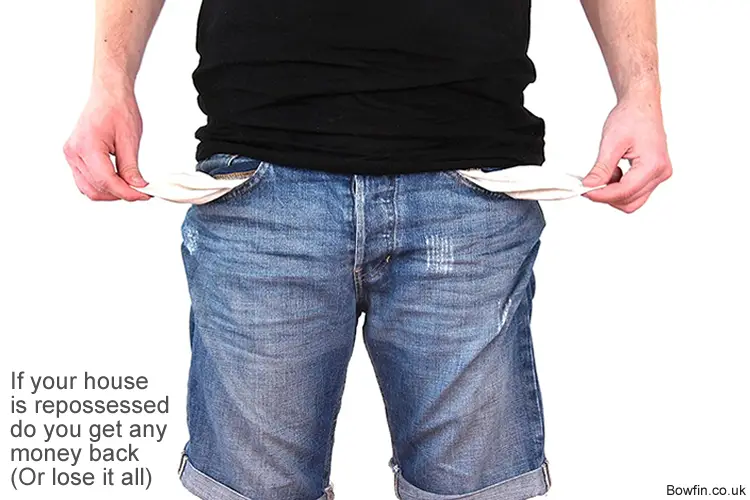
If you’re pondering the question ‘if your house is repossessed do you get any money back‘. Or perhaps you’re worried that you may lose it all. You may want to read on. Also be aware that your debt problems don’t necessarily end after your house has been repossessed.
If your house is repossessed do you get any money back? The number one reason why you will not get any money back after your house has been repossessed is because your mortgage lender will sell your house at well under market value. Lenders are not in the property business, which means that all they want is to get their money back as fast as they can.
What are the chances of getting any money back after your house is repossessed?
Whether you’ll get any money back after your house has been repossessed depends on how much equity you have in your home at the time this happens.
For each loan or mortgage secured on your home, if you’re in arrears on any one of them, each lender has the same rights to apply to the UK courts to repossess your home.
In the event your home is repossessed, the proceeds from the sale of your house will first be used to repay each of these secured loans.
Depending on how much of your mortgage is unpaid, any money left over after repaying these lenders, and after paying for any legal fees, repossession costs and court fees, will be paid to you.
If your house is repossessed do you get any money back
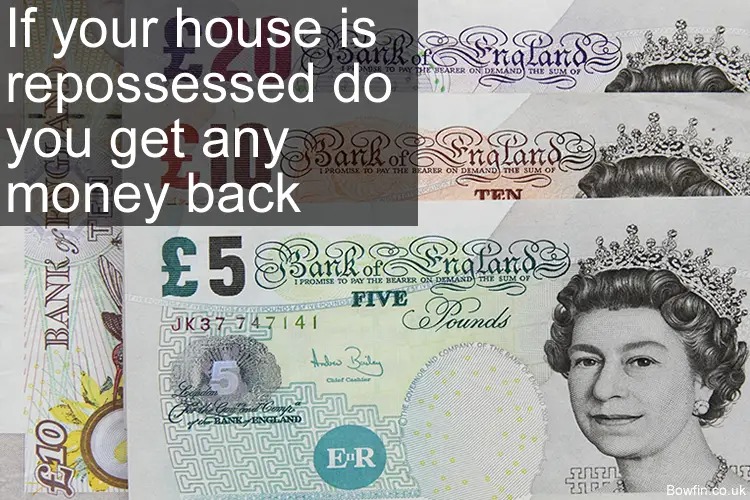
Getting back to the original question of if your house is repossessed do you get any money back, let’s take a look now at why you may not get money back. Even where you thought you had equity in your house.
Your lender will sell your repossessed house at under market value
As already explained, the main reason why you will not get any money back after your house has been repossessed is because your mortgage lender will sell your house at well under market value.
Lenders are not in the property business, which means that all they want is to get their money back and as fast as they can. This means that they will sell your house quickly usually at auction.
A quick sale means a lower than market valuation. Normally, repossessed houses sell for at least 25% below market value.
For example, if your house is worth on the open market say £235,000. But let’s say your mortgage outstanding is 176,000, including any arrears. This leaves you with equity of £58,750.
Let’s now assume your mortgage lender sells your house quickly for 25% under value. This would mean it sells for 176,250.
But then there are selling fees, and let’s assume these amount to £2,500.
The net proceeds the mortgage company will receive from selling your house will be £173,750. Which is less than what you owed on the mortgage by £2,250.
This is before the other added costs, which are discussed below.
More Reading: How can I stop my house being repossessed? (12 Options To Stop it)
Court fees and legal costs for the repossession process
Your mortgage lender will need to spend money both on legal fees and court fees to repossess your home. These are not cheap and would likely amount to in excess of £1,000.
This means that the negative amount noted above of £2,250 will be increased by these court costs and legal fees.
The conclusion is that even where you have a reasonable amount of equity in your house, you are unlikely to get any money back. But also, as already mentioned, if your house is in negative equity, or if there’s very little equity in it, you don’t stand a chance of getting any of your money back.
But there is a solution to this problem, and it will help more than you might realise.
House repossession process and how it works
How the house repossession process works is important to understand. As this will help you to see why you may not necessarily get any money back after your house has been repossessed. This can be true whether you have equity in your house or not.
Of course if you are already in negative equity, you don’t stand to get any money from your property after it has been repossessed.
More Reading: What is negative equity?
Your home is not yours if you have a mortgage secured on it
Many people who own homes in the UK who have mortgages don’t appreciate how their homes are actually owned by the mortgage company. When you signed a mortgage contract, the mortgage lender has a right over your house.
This right extends to the fact that if you fail to make your mortgage payments, they can repossess your home. Even just one missed payment will put you into arrears with your mortgage lender.
More Reading: How many months mortgage arrears before repossession?
The wording recommended by FCA documents reads “YOUR HOME MAY BE REPOSSESSED IF YOU DO NOT KEEP UP REPAYMENTS ON YOUR MORTGAGE.” In other words, this is a warning to make you aware that you must keep paying your mortgage.
It’s not always easy to get out of your mortgage once you’ve signed the contract and drawn the money.
More Reading: How can I legally get out of my mortgage?
Missing mortgage payments creates a ticking repossession clock
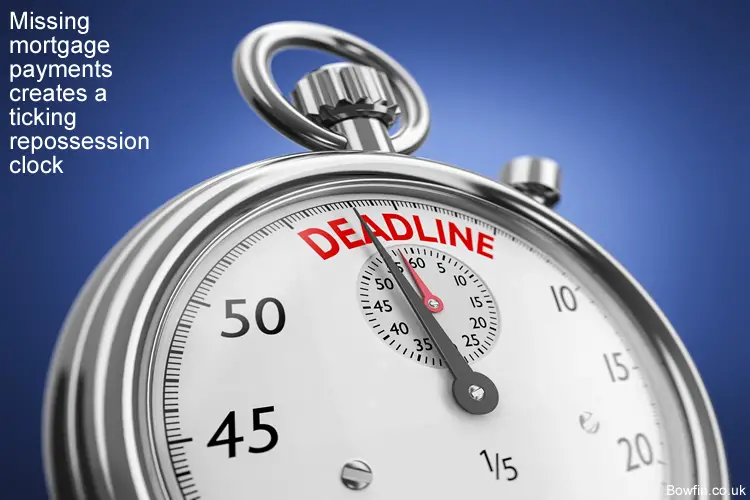
For each mortgage payment that you miss, the closer you get to being repossessed. If you don’t act quickly and respond to your mortgage lender when they write to you, the repossession clock simply speeds up.
There is a process that all mortgage lenders have to follow. They must follow this procedure before they are able to repossess your home.
Part of this process involves them applying to the court for a repossession order. If you are unable to offer a solution to the court. Or if you offer a solution, but the judge dismisses your offer, judgement will be made to the lender for repossession.
It is then only a matter of time before you will be ordered to leave your home.
What happens after your house has been repossessed
After your house has been repossessed, the mortgage lender will review the numbers.
- The lender will assess how much the property has netted when it is sold.
- They will total the amount left outstanding on the mortgage. This amount will include any arrears and penalties.
- The mortgage company will add up all the legal costs for applying to the court and add-in all their legal fees.
- The balance, if any will be repaid to you.
- If the net of the above means that you owe money to the mortgage company, they are entitled to come after you for this money.
- They can if they choose make you bankrupt in the process. Which may mean that you could lose any other assets you own.
More Reading: If my house is repossessed can I get another mortgage?
Seek help from a property solutions expert
Within reason, no matter how far down the repossession track you are (obviously this will not count if your house has already been repossessed), there is a solution at hand.
If you can avoid being repossessed and stop the repossession from happening, you’ll not only prevent being humiliated when you’re evicted. But also, your credit rating in the future will be less tarnished.
Your credit rating will have been affected, as this happens the minute you miss one or more mortgage payments. But if you stop the repossession from happening, you won’t have a repossession on your credit rating.
To find out more on how you can seek help on stopping your repossession, please contact us immediately. For example, in the example explained above, where the home owner had £58,750 of equity, there’s every possibility you’d get some of this equity out.
A bonus to this solution is you don’t need to involve and estate agent either. This saves on estate agent commission fees.
What is life like after a house repossession?
Life after a house repossession may be tough. Your credit report will be damaged badly. This will make it near impossible to obtain credit. It might also be difficult rent too as landlords often also carryout credit searches.
The repossession process is extremely stressful and can be damaging to relationships. One of the top reasons for divorce is cited as money problems. With the high stresses involved with a lack of money arguments are common.
This is just one of the many reasons why I urge anyone to avoid repossession if they can.
If your house gets repossessed what happens to your stuff?
When your home gets repossessed your stuff still belongs to you. The bank is interested in the property and will clear out anything left behind. You need to remove your things before handing over the keys.
But if this didn’t happen you need to speak with the lender to get your belongings back before they are destroyed.
Your belongs won’t be kept for very long after the repossession. This is usually only around 14 days. Which means you need to communicate with your lender if you want your belongings back.
Generally speaking when a bank obtains a repossession order they will write to you about the order and ask you to vacate and to remove all your belongings from the property.
Belongings include things such as clothes and shoes, kitchen utensils, cutlery and such like, beds and bed linen and any tools you have. But it does not include fittings such as kitchen cabinets, carpets and doors, as these form part of the house.
I hope you’ve got something from reading this article on “if your house is repossessed do you get any money back“
If you’ve enjoyed this article on “if your house is repossessed do you get any money back” please share it on your favourite social media site.
Also, if you have any questions, please feel free to comment below too. Alternatively, if you need more help, please feel free to contact us on our contact us page here. Or join the discussion and ask your question in the property forum.

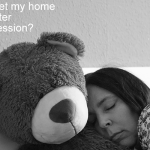
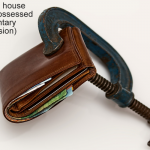
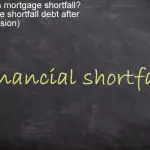
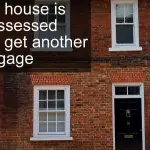
I have a joint mortgage with my ex partner who is non contactable. I want to sell the house as i cannot afford to keep it on. The house is worth £260k and I have a mortgage of £97k
I have tried many times to find him over 6 years. He has not paid any money towards the mortgage and the deposit for the purchase of the house was mine.
Please help
Hello Nikki – an interesting and difficult situation you have there. If your partner is on the title deeds, i.e. rather than simply on the mortgage, it’s not easy to have them removed without their permission. If you were in contact and your partner was not in agreement to sell, you could apply to the court for a decision. The courts have the power to force a sale. However, in your case when you are not able to find the co-owner, I’m not sure how this works and the only advice I can suggest is you speak with a solicitor on the matter and ask for their guidance. Please come back and let me know how you get on, as I’d like to know how and if you are able to resolve this problem.
Thank you for your response. Yes he is on the deed unfortunately.
I managed to track him down a while ago and he agreed to remove himself and allow me to sell. He even spoke to my estate agent and said he was happy to let the house go on the market. I have a sold board outside the house and buyer’s ready to move in but he had disappeared again and it looks like the sale will fall through.
I will keep you posted once I have sought legal advice.
Hello Nikki – how frustrating!! Just a thought, have you thought about instructing a private investigator to track him down, as they have ways to find people. Not sure of the cost of something like this, but it’s a matter of weighing up the cost of finding him vs not. But a conversation with your solicitor would be a good starting point to see what can be done, as it doesn’t seem right that you are stuck with a property in this way. If the court were to agree to force a sale, his share of the proceeds could be held in escrow (or a solicitors account) until such time as he is tracked down to agree to allow you to have the funds if that’s what should happen. I am sure that if things were different and the property were being repossessed as an example, I doubt whether this would stop the repossession from taking place, nor a forced sale agreed upon by the courts to repay the mortgage etc.
my friend’s house will be repossessed soon. she has given her keys to the bank while a lot of her belongings are still in the house.
what would happen to her belongings (clothes, books, jewelry, pianos, furniture etc)? is there still a chance that we can take back some of the items? will the bank sell the items through auction? there maybe a few items that we want to get back from the house.
thanks!!
Hello Anna, that’s a shame this has happened to your friend, it’s also a shame she didn’t come to us, as we may have been able to help and stop the repossession from happening in the first place. Anyway with that being said, the bank isn’t interested in her possessions, but as she has already passed the key back to the lender. she will need to contact the bank to get them back.
Normally when a house is repossessed, the bank will take steps to remove and store the items or stuff. They want to return them to their rightful owner, which in this case is the property owner (your friend), but usually they are kept for around 14 days. So just in case they have already removed her stuff, she needs to act fast before they are destroyed. Having said that I would think the bank will try to make contact with your friend for her to collect her belongings in any case, assuming they have her up to date details for this.
My house was repossesed in july 2019 and it was sold in 2020. I owed 38,000 on the mortgage and the house sold for 72,000 to date I have not received or heard anything from my lender, there was no other debt on the property can I contact them to see if I will receive any money back after all the costs are deducted, any advice would be appreciated ty
Hi Lily, firstly, I’m sorry to hear you were repossessed, this must have been very stressful for you! Yes it won’t harm to make contact with them, as although there are costs associated with a repossession, I would hope that it would not be £34,000. How long ago in 2020 was it repossessed? Please let me know how this worked out and if you managed to get anywhere with your lender.
My house valued at £700,000 was repossessed and sold by the building society for £600,000. The outstanding mortgage was £ . How do I stand regarding getting any money back from the lender?
Thank you,
Mike Harris
Hi Mike, thank you for your question, only you left out the amount left on your mortgage – please get back to let me know how much was outstanding.
Part of your article is not accurate. If you have a mortgage, the lender DOES NOT “own” your house. They merely have a legal tie as security for the loan. The house is yours, 100% of it from day one. The seller asked for a sum for the property and you have paid that sum.
If there is any doubt as to ownership, check the deeds to see who owns it.
Furthermore, if the lender owns it, why would they need to go to court to repossess it. You don’t need to repossess something you already own.
Hi Mick,
Firstly, thank you for your comment and engagement with my property blog, always very much appreciated and welcomed.
I accept what you are saying and I agree with you that it’s the “homeowner” who’s name is on the title deeds. But try not paying your mortgage for a few months and you’ll soon realise that what’s noted on the title deed makes no difference, as it’s the bank who control the ownership.
This is the point I was trying to make, but perhaps it’s not quite made correctly.
Does that make sense?
Thanks for your reply.
I accept what you say about not paying your mortgage, that is simply the security element.
If you want to do anything to your property you only have to inform the lender so they can confirm you are not doing anything to reduce its value. You are not asking permission. You are, as the condition of the lending will state, informing them.
Just to emphasise the point of ownership. When you buy a property for (say) 200k, then 5 years later sell it for 250k, who gets the 50k profit? If the lender is the owner, they are very generous in giving up the profit their property has made.
Thanks again for the clarification of your earlier point.
Hi Mick,
Thank you for your further good point and I also agree with this, as in the true sense of ‘ownership’ any profit made on sale would be shared equally between owners, which the bank is not an owner in the trues sense of the word.
The same is true for a repossession too. So if for example the home that is repossessed was originally purchased for the same 200k and is now worth 250k when it’s sold by the mortgage lender, the original owner would benefit from the increased value. However, if a house is worth 250k when it’s repossessed, it’s unlikely to be sold by the bank at this value. In truth the property would be sold at auction at under market value, probably to an investor. Which is why I strongly advise anyone who is about to be repossessed to prevent this from happening as far as possible.
For anyone reading these comments, in addition to the main article about repossession and getting your money back, the important thing to take away is that if your home is repossessed, it is the bank who gets paid first (which is the same in any house sale actually). It’s only if there is any money left over after the bank has been paid in full (including any outstanding mortgage payments, loan interest, repossession charges and legal fees) will the original owner get any money back.
Mike makes a good point and is valid for repossession. The point being that if the house value has increased significantly, which in his example is by 50k or 25%, you may lose much of the increased value if you are unfortunate enough to go through repossession. However, if you are able to prevent the repossession from happening in the first place, you stand a much better chance of getting more of your equity back from the property. This assumes you have equity of course.
Hello, my house was repossessed in March 2014. My ex partner had a severe gambling habit and the mortgage company changed our payments from interest only to a high rate and it became unaffordable. The house was on the market for £579,000 as we were trying to sell. Halifax sold the house for £389,000 which was the same price as I paid for it in 2006 – we had also renovated the property to a very high standard. I know they sell houses under market value but this has left me in a position where I owe them £65,000. As the remaining mortgage was £425,000. I didn’t hear anything from them until 2015 when they told me there was a shortfall. I complained at that point that they sold the house too cheap and I wanted to see what valuations they had done. After that I didn’t hear from them until July 2020 – well a debt collection agency sent the letter to say they were chasing this shortfall payment. I called Halifax straight away and they said I can’t complain now because it’s been six years. I found this very underhand as it’s almost like they contacted on purpose after the six year had passed in April 2020. I have written to the FO but not had a response as yet. I am not in a position to pay this money. And to top it off my ex partner went bankrupt in 2018 and so they are not chasing him for payment just me. I think this is also very unfair considering it was his fault we lost the house. It’s an awful position to be in right now. If they were to make me bankrupt I would also lose my job as I work within the FCA. Any help on this would be appreciated. Many thanks
Hi Laura, thank you for your comment and question. This doesn’t sound very nice at all and must be extremely stressful for you.
For something like this can I suggest you speak with a solicitor as far as dates of claims etc. This will cost you money, but you need to get some good legal advice on your rights and where you stand. You could also speak with the Citizens advice – take a look at their website here: https://www.citizensadvice.org.uk/. Citizens advice offer free advice and will also be able to point you in the right direction too. Another organisation I recommend you speak with is Step Change, their website is here: https://www.stepchange.org/
Sorry I can help you any further on this question, but please come back and let me know how you get on.
I was with my ex partner for 14 years we split 16 months ago and I remained with our 3 children in the home we habe a joint mortgage on. He refuses to come to an agreement with the home and does not contribute to the mortgage. The fixed term is coming to an end and I cannot afford the variable rate. I have sought legal help but there is no resolution and I have been told there is nothing I can do. The mortgage company also state they cannot help or ‘get involved’. From next month I cannot afford to pay the mortgage and it will go into arrears. Is there any advice you can please give me?
Many thanks
Hi Jay, thank you for your comment and question. This is a difficult question to resolve to which there are a few options:
1. You could rent a room to help with the mortgage payments, but if you do so seek permission from your mortgage lender beforehand. However, this relies on having a spare room to rent and you being comfortable with lodgers in the house when you have children. But also, £7,500 of this rent will be tax free under rent a room relief.
2. Sell the house and split the net proceeds (i.e. the equity) between you and your ex-partner. If your partner is not willing to sell, you can speak with your solicitor about how you force the sale. Of course this option means you will need to buy a new home or move into rented accommodation once your current house is sold. It also involves applying for a force of sale in the courts, which can take time.
3. Is your ex partner contributing to your child maintenance? If not you could seek to have this resolved with the Child Maintenance Service (CMS).
4. Also, speak with the Citizens Advice as they offer free help and advice and may be able to point you in the right direction on the house sale and on child maintenance.
Try as much as you can to avoid going into arrears as this will affect your credit rating. A bad credit rating can make it much more difficult to get another mortgage and it can also affect becoming a tenant too. Also, take a read of this article too: https://england.shelter.org.uk/housing_advice/repossession/options_to_avoid_repossession_of_your_home
Apologies for jumping onto this topic, cant seem to be able to post it as a new topic.
in 2009 i got divorced from my wife, she remained in the property along with our son, and her boyfriend, as part of the divorce, it was agreed that my name would be removed from the mortgage.
to this day, i am still stuck on the mortgage, my ex has and has had no interest in having me removed, the mortgage company said they will not remove from the mortgage as my ex does not earn enough to warrant.
to compound matters, the mortgage is on an interest only, so the balance of 160,000 remains.
i estimate the value of the house to be approximately 185-190k now.
there is around eight years left on the mortgage, and that is when the repossession will happen, my fear is that i will be liable along with my ex (who does not seem to care) for the difference which i imagine will run into thousands.
i have been reluctant to do anything about this as my son was young, and it did not want to be responsible for him having to leave his childhood home, he is over 18 now, so i feel i should really look into what my options are.
is there any advice you can give me, experience tells me that my ex will block me at every opportunity and the last thing i want is for things to get messy with my son.
if there any advice you could give me on this matter it would be greatly appreciated.
Hello AD, thank you for your comment and question. I think you will need to speak with a solicitor on this one I am afraid. You can force the sale, but this can take a long time and can get very expensive in legal fees.
Having said that, and before you speak with a solicitor, and before things start to get expensive for the both of you, please try and mediate between you. There is still equity in the house from the numbers you listed above, and I will leave it with you how you wish to split this, but if you go down the legal route, any equity will be lost.
But also, if you go down the repossession route, this equity will be lost too, but more importantly, both your credit files will be trashed, as I am sure you are aware.
Sorry that I cannot be of any more help than this. Where is the house?